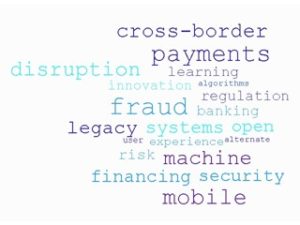Now that Money20/20 is still fresh in our minds, and before moving on to other topics of interest, let’s take a look together at the agenda of the events we attended, the debates that really matter in order to shape up the future of the financial ecosystem.
General sessions (mostly mentioned in our previous blog posts) were alternated with networking breaks focused on specific points of interest (such as shared ledgers, InsurTech, PSD3, biometrics) and track sessions tailored to everyone’s needs.

Among others, track sessions focused on case studies and provided insights on hot topics like alternate financing, algorithm-based innovation, legal and regulatory aspects, mobile payments, open banking, legacy systems, machine learning, user experience, cross-border disruption, as well as risk, security and fraud.
Bronze, Silver or Golden Bullets?
- Open banking will revolutionize the banking sector and payments landscape, but customer trust will be crucial to succeeding in this new age.
- The business model of the bank should transform towards an orchestrator of financial needs, linked to the financial heartbeat of its customers and beyond the traditional product orientation of the past.
- Convenience, continuity between the physical and digital world, mission-critical security and the human factor will be the magic combination to shape the future of payments.
- There needs to be a paradigm shift in the business model for core banking services – to be quicker, more cost-effective and more flexible in order to satisfy the digital global economy.
- Banks’ greatest strengths (their size, scope and scale) can complicate the delivery of new capabilities. Collaboration with FinTech startups can be the path to creating next-generation services for global banks.
- In light of PSD2, strategies should combine transparent security and strong authentication to unleash the potential of open banking.
- There are many key factors that are both disrupting the underlying market infrastructure and creating a much more open ecosystem. Financial institutions need to transform themselves amid dramatically changing consumer expectations and mass adoption of new technologies.
- What do the financial crisis, Brexit and the rise of FinTech all have in common? They have served as a catalyst for a dramatic shift in the balance of power: from traditional sources of information and firmly back into the hands of customers and innovators.

There’s Something Else on Our Minds…
…the Unbanked and Underbanked
Whether we talk about the poor access to mainstream financial services, or even the lack of a bank account, there are about 3 billion people in one of these situations throughout the world. That’s a huge and sad number, no doubt, but it can also be seen as an unrivaled opportunity. It’s not just about connecting these groups to the financial services ecosystem, but also transforming their lives and reducing global poverty.
Micro-loans, payments, remittances and mobile banking are just some of the many services that countless communities lack access to, and years to come will see an increase in debates on financial inclusion and developing commercially viable solutions.
On one hand, banks should partner with FinTechs, in order to benefit from new technologies, and on the other with microfinance institutions, since they are the ones that have most interacted with the underbanked, got to know each other very well and built trust, being able to convince them to take a step further and move from cash to digital.
The government plays three key roles in this whole process: as policy maker and regulator, in terms of infrastructure (public offices that would bring banks closer to people), and as initiator of payments to unbanked and underbanked by means of social services.









